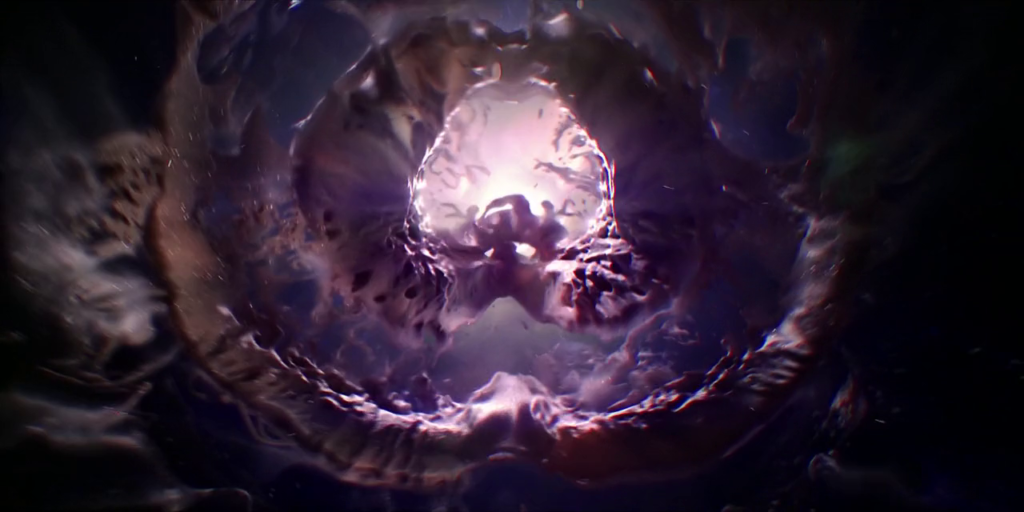
I’ve had a lot of time to think on this season of Doctor Who. In many ways, it’s been the season I’ve looked forward to the most in the entire modern run of the show. Despite my reservations about Chibnall at a showrunner, despite the cynical tone of his previous contributions to the series and the uneven tone of Torchwood, I was buoyed by the prospect of change. After all, Steven Moffat’s first season as showrunner gave us what was the best season of the revival until Capaldi’s second season five years later. Doctor Who is a show built on change – that’s one of the reasons it has endured for as long as it has. If one is to love this show, one must embrace change.
However, not all change is good change, and while Whittaker’s turn as the Doctor absolutely sizzles, the writing and tone of the season have not. Let’s review, shall we?
Potential spoilers, obviously.
11.01 – The Woman Who Fell To Earth
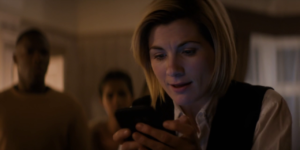
Regeneration episodes have a history of being… well, difficult. For every success like “The Eleventh Hour” and “The Power of the Daleks”, there’s a clunker like “The Twin Dilemma” and “Castrovalva”. Even perfectly serviceable regeneration stories like “Robot” and “Deep Breath” are held to impossibly high standards – the first televised story featuring a new Doctor has a lot riding on it, and none more than “The Woman Who Fell to Earth”.
Fortunately, the episode is a dazzling experience that (mostly) works. We’re gradually introduced to each of the companions and their ties together as well as two separate pieces of a deadly alien puzzle before the Doctor herself drops into the middle of events and takes control. Throughout the episode we see the Doctor at her most brilliant and inventive best – putting pieces of the puzzle together while fighting her post-regenerative trauma, fighting off not one but two alien menaces (that, of course, turn out to be the same threat), and literally building her own Sonic Screwdriver using a mixture of Sheffield steel, Stenza technology, and her own brilliance.
The Screwdriver scene in particular is superb, but with hindsight it is perhaps the first instance of a problem that will plague this season throughout its run – Chibnall’s need to over-explain the scifi elements of the show. Don’t get me wrong, I adore this scene – we’ve heard about how the Doctor invented his Sonic Screwdriver, but its actual fabrication in-show has always been handed off to the TARDIS. Having the Doctor build one from scratch shows off that the Doctor is resourceful and, most importantly, that the Doctor is still the Doctor, regardless of the shift in her gender. We’ve never needed the Doctor to show the Sonic being built before, but this episode needs it to show how capable and resourceful this Doctor is. It’s a great note to hit, and it’s a pity that echoes of it rub me the wrong way later in the season.
The companions hold their own, too – Yaz is smart, capable and brilliant as a junior police officer who wants to do more, while Ryan is struggling with dyspraxia, a neurological disorder that affects his coordination, as his grandmother and step-grandfather, Grace and Graham, try to help him learn how to ride a bike. Graham’s core struggle at the start of the episode is getting Ryan to accept him as family, but by the end of it it’s dealing with Grace’s death at the hands of an alien assassin. Importantly, this is the most culturally diverse Team TARDIS yet, with an Indian woman, a black man and a n older man in, at the very least, his 60s. The Doctor has traveled with people of color before, but not enough – in the space of a single episode, the Thirteenth Doctor has traveled with the same number of POC companions that the Tenth Doctor traveled with in his entire run on the show. I love it.
The alien threat this episode comes in the form of T’zim-Sha of the Stenza. Cold, calculated and brutal, T’zim-Sha (or Tim Shaw, if you like) feels more like a foil for Torchwood than he does for Doctor Who, and it’s also interesting to note that much of this episode carries the darker, grimier feel of the spin-off that Chibnall shepherded for two seasons a decade ago. We never see just how brutal this monster can be, only ever hearing it as the acts themselves are carried out off-screen, but that arguably makes it worse.
In all, this is a strong opening for the Thirteenth Doctor, and at the time it bode well for things to come. What’s more, it ended on a cliffhanger! The Doctor and her new companions, zapping away to find the Doctor’s TARDIS, instead find themselves floating unprotected in the depths of space – no spacesuits, no spaceship, with death almost certain. We’d been led to believe that stories would be standalone, so the idea that those individual stories might bleed into each other, as they often did during the Hartnell era, was an exciting prospect.
Unfortunately, the next story didn’t quite live up to that expectation.
11.02 – The Ghost Monument
With that cliffhanger resolved Hitchhiker’s Guide style – two passing ships collect our team in two groups of two, and not only are they both heading to a nearby planet, they’re conveniently heading to the same planet where the Doctor’s TARDIS has vanished off to! Both ships are participating in an annual intergalactic race to the finish line, which gives us our first real problem for the episode – the race never feels like a race. There are no spectators, there’s no sense of urgency, and even the planetary hazards are handwaved away for the most part. A big deal is made out of the “carnivorous water” that the Doctor, her companions and the two competing racers are about to sail a boat across, but it never comes up again – a neat idea, not capitalized upon. Once again, a recurring theme in this season of the show.
“The Ghost Monument” can best be described as a long walk. There’s nothing wrong with a nice long walk, but as a source of entertainment walking has never been particularly engaging. Even The Lord of the Rings breaks it up with the occasional inter-personal argument or Wraith attack or what have you. Most of the threats they encounter are either easily overcome or, as with the water, just ignored entirely.
The episode gives us a couple of great moments of bonding between Ryan and Graham, but Yaz is woefully under-utilized here, which is the beginning of yet another trend that plagues this season just as it did in the 80s when the Fifth Doctor traveled with a trio of companions. Yaz’s only real contribution to the episode is to give Ryan someone to unpack emotions at, and this is something Yaz will find herself doing a lot throughout the rest of the run. Yaz, more often than not, doesn’t get to be her own person. Her personality is ill-defined, a product of a writer’s room – or, perhaps, a showrunner – that doesn’t really know what to do with her. She’s an interesting character – her origin shares similarities with Judy Hopps of Zootopia, as the internet has gone to great lengths to remind us – so it’s a shame that it takes such a long time to get her wheels spinning this season.
By the end of the episode, we have a couple of bits of foreshadowing – the planet they’re on was ravaged by the Stenza, the race Tim Shaw belongs to. And what’s this about the Timeless Child? At the time, these felt like seeds for season arcs, but they’re never touched upon again. Regardless of what you thought of the way Russell T Davies and Steven Moffat ran the show, they at least had strong throughlines through each of their seasons. Chibbers, on the other hand, throws a couple of ideas out that he largely abandons. For a season that has, more so than any other of the show, been largely informed by the way people are binging shows on streaming services like Netflix and Amazon Prime Video, it’s surprising that Chibnall opted to skip the season-long thread-tug approach that held people’s attention during his predecessors’ runs of the show. Instead, he presents several threads here with no indication through the rest of the season that he intends to unravel any of them.
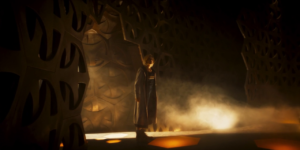
This episode gave us a lot of firsts for the new season – our first look at the new title sequence, which is gorgeous. Our first proper listen of the new theme, which has been divisive but that I largely adore. And, of course, our first look at the new TARDIS. Which… well, where do I start? Aesthetically, I don’t hate it. It’s not my favorite TARDIS interior, certainly, but it’s better than “sheet hanging behind Sylvester McCoy as he leans to close to the console.” Unfortunately, it’s not much roomier. This is arguably the smallest, most cramped-looking TARDIS set we’ve had on the show since David Tennant had to use the smaller Doctor Who Experience version of the Tenth Doctor’s console room in “The Day of the Doctor”. The production even had to shoot from outside of the new TARDIS set with a crane to get some of the wide shots of all four of the leads around the TARDIS console, and that’s bad news. This is the most companions we’ve had on the modern run of the show, and you want a TARDIS that looks like it can fit them all in. This, sadly, doesn’t quite look the part.
It doesn’t help that it’s so dimly lit, and one wonders if the moody lighting here is in part to disguise just how tiny this set really is. The console isn’t much better either, with a severe lack of interactive elements for Jodie to play with. Eccleston, Tennant, Smith and Capaldi all had levers, dials, switches, toggles, buttons, pulleys and hammers to push, pull, nudge, elbow and fondle, while Jodie has a sandglass, a lever, and a custard cream dispenser. It’s really going to be difficult to show her piloting the TARDIS in the way previous Doctors have been seen to do it, and the distinct lack of shots of her doing this throughout this season are really telling. For the first time, I find myself looking at a TARDIS set that I really, really do not like. That’s a shame, because – as Michael Nixon pointed out during one of our Look Who’s Talking shows at Geeky Teas this year – we’re stuck with this set for at least two seasons.
“The Ghost Monument” was a weak, low-key second episode. It looked cheap, it spent a lot of time dancing around itself with padding, and – again – it looked grim, dark and miserable. Above all, though, it was boring. Compare with the second episode of almost any other season of the revival, and you have legitimate reason to worry. There was a legitimate hope that future episodes would pick up the slack and be more fun affairs.
But that would have to wait another week.
11.03 – Rosa
This is, I will be honest with you, an episode I was dreading. There are so many ways “Rosa” could have gone sideways; my concerns oscillated between the worry that they’d come up with a science-fictiony cause for the racism of the era – some kind of mind ray or space rock, for example – and the deep and, I think, valid concern that it would come across as patronizing finger-wagging. This is, after all, a British TV institution commenting on American racism. That’s a bit like getting a lecture on civility from your racist uncle.
We’ll be coming back to that analogy in a few episodes, by the way.
But “Rosa” was, despite its flaws, shockingly good. Alright, it has a lot of flaws – its main villain, Krasko, is a time-traveling space racist who can’t kill Rosa Parks thanks to a chip put in his brain as punishment for murdering thousands of people and oh, who cares? He’s dull. He’s easily the most boring part of the entire episode, so much so that the show can’t even commit to having him be a significant menace for the bulk of it, having Ryan zap him away with a time displacement gun slightly past the halfway mark (proving in the process that Ryan learned both bugger and all about guns from the previous episode).
But Krasko’s goal isn’t to kill Rosa Parks, mostly because he can’t. No, he plans to engineer events so that she doesn’t have to give up her seat on the bus that infamous night in Montgomery, Alabama. It might even have worked too, were it not for the fatal flaw in his plan: It’s stupid. He’s stupid. Team TARDIS consequently find themselves having to undo the changes he’s made to ensure Rosa winds up on that bus that night, and I will admit watching them dash about from place to place to ensure that historical racism happens on schedule did make me feel anxious and tense – the first time I’d felt either this season, and we’re three episodes in.
This is not an episode that shies away from how brutal, uncomfortable and unkind racism can be. Ryan is smacked across the face for the sheer temerity of trying to talk to a white person. Team TARDIS gets the stink-eye in a restaurant solely because half of the group has the sheer bloody-minded cheek not to be white. A cop barges his way into their motel room because it’s illegal for people of color to stay there. Some of these scenes give characters wonderful moments – the Doctor’s response to the probing cop is deft, and Ryan’s response to the waitress telling them they “don’t serve negroes” (“Good, ‘cos I don’t eat them!”) is inspired – but it doesn’t undercut just how severe a time it was for people of color in 1950s Alabama.
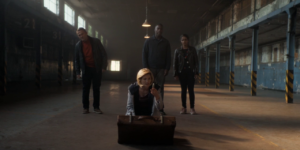
The episode mostly focuses on Ryan’s upset and Graham’s discomfort with the era the team have arrived in. Yaz gets a couple of moments, but she’s mostly sidelined again – her bit contributions in the episode are deliberately delaying Rosa Parks so she gets on the right bus at the right time, and, for the second episode in a row, giving Ryan someone to talk to about what’s happening. The writers seem uninterested or unable to utilize Yaz at this point in the season, and though they’ll find a balance later on (shortlived though it will be), shoving her off to the side in an episode about racial tension is unforgivable. Frustratingly, this will happen again in a few episodes time, and that’s in the episode about her Indian heritage.
In the end, the Doctor can’t help Rosa during that pivotal moment in history, a painful thing to watch considering the Doctor’s refrain of “When people need help, I never refuse” – said in the first episode, and included in numerous launch trailers for the show. Having the Doctor, a white woman, stand aside so that a woman of color can have her moment of strength is important. Yet it still leaves me feeling uncomfortable. Not because we had to watch our heroes allow Rosa Parks to be arrested, although there is a discomfort there which should absolutely be felt, but rather because… well, Rosa ultimately got her moment because a white woman and her friends (which, in all fairness, does include two people of color) stepped in to allow events to unfold that way. Rosa has her moment – a strong, impactful moment in the history of the American civil rights movement – but the subtext, to me at least, feels very much like “women of color get their moment only when white women allow it,” which was… not ideal. It was not great.
My takeaway from the episode at the time was that it will most likely age like any number of Quantum Leap episodes that tackle social justice issues – it’s progressive, important and good now, but it may well become cringeworthy telly in a handful of years.
Right now, though, I think it’s a gnat’s testicle short of being brilliant. A strong, powerful and important story. I just wish it’d happened in a season that was a little more fun to watch. Gritty stories like this are brilliant, but they’re best placed around more fun stories, and that’s something this season sorely lacks. We’ll come back to that.
11.04 – Arachnids in the UK
If there’s an award to be given for the worst episode of the season, “Arachnids in the UK” comes dangerously close to winning it.
There’s a lot wrong here. Giant spiders invade Sheffield, except they’re not from space – they’re from a fancy hotel owned by a Mr. Big from Sex and the City which was built on top of a landfill that, it turns out, cut corners and buried something potentially toxic. The Doctor’s solution to this problem is, essentially, lock the giant spiders in a cupboard and let them starve to death. She acknowledges there’s probably something toxic in the landfill, but doesn’t actually do anything about that.
Worst of all, though, is that the Doctor is so against using guns she’d rather watch a giant spider suffocate and die than put it out of its misery. Step in Mr. Big (who, I should point out, is a Trump-like figure) to shoot the spider dead and then just sort of… walk away. With a gun.
One of the biggest criticisms of season 11 up until this point is that the villains have all just sort of… gotten away. They’ve vanished. It’s not a criticism I actually agree with. T’zim-Sha got zapped away and blown up with DNA bombs. “The Ghost Monument” didn’t really have a villain, but it did have – and I’m realizing I forgot to mention this earlier, so pause for effect – was sentient bedsheets. “Rosa” had a villain, but he was just sort of removed from the story, more or less literally. But “Arachnids of the UK” is definitely guilty of this accusation. Whether you consider the villain to be giant spiders, toxic mutagens or the capitalist moron with a pistol, none are really dealt with. In the end, we’re left with a story that would have played out more or less the same if our heroes hadn’t actually shown up.
Yaz’s family plays a fairly big part in this episode, but don’t think that means Yaz herself gets more to do. We learn more about Yaz’s father than we do about her, and at almost halfway through the season that is a problem.
It’s difficult, really, to say anything else about the episode. It’s bad. It represents a real low point in not just the season, but the show as a whole. I had hoped that the show would bounce back the following week.
11.05 – The Tsuranga Conundrum
Enter “The Tsuranga Conundrum”, an episode title I have only this week managed to commit to memory, and an episode so boring that, at time of writing, nobody at the TARDIS Data Core wiki can muster up the enthusiasm to write out the synopsis for it.
The core conceit of the episode is a good one – there’s an alien called a P’Ting that eats everything loose aboard a hospital ship. People could die. They don’t, of course, because the Doctor is clever, but my God, do we take some time getting there.
This is an episode chock-a-block full of padding. This isn’t an exaggeration – at one point, the Doctor announces that everyone is to gather for a meeting in seven minutes, and then we literally spend the seven minutes before the meeting (though it feels much longer) having a bunch of inconsequential scenes with hospital patients. This fleshes out the patients’ characteristics, personalities and backstories nicely, but does el zilcho to actively move the plot forward. It’s perhaps upsetting to learn that we know more about some of these supporting characters than we do about Yaz at this point in the season. We see the P’Ting in, I think, two scenes, both fully half an hour apart – as threats go, it doesn’t do a lot to be threatening for the bulk of the episode, which is a shame because as alien creatures go it’s a belter. It’s just a shame it wasn’t put to good use. Certainly there’s the potential for someone to do something interesting with the concept in a later episode, or possibly a spin-off like a novel or a Big Finish audio, and it’s interesting to think that we have an alien who could well pull of a reverse Weeping Angel, where each successive reappearance makes them more interesting, more threatening. But maybe that’s just blind optimism.
In the end, an act of self-sacrifice and a small explosive save the day – the P’Ting eats a bomb and is flushed out into space full and happy, giving the “all the villains get away!” crowd another arguably undeserved feather in their hat. Ryan convinces someone who doesn’t want to be a parent that he has to keep the baby he’s about to have despite said parent actively stating several times that he’s not ready or capable of being a parent. The Doctor’s Sonic Screwdriver gets eaten and becomes useless right up until the moment she needs to use it, at which point it starts working again.
A lot of it doesn’t work, and it’s compounded by some absolutely baffling writing decisions that make this not just the worst episode of the season, but arguably one of the worst episodes of the revival. Right now, if given a choice between “Fear Her”, “The Rings of Akhaten”, and this, I’d sooner watch the scribble monster or sing grandfather to sleep. Definitely not one I am in a hurry to rewatch.
11.06 – Demons of the Punjab
Like “Rosa” before it, this episode looks at the effects of white influence over people of color. Unlike “Rosa”, however, it absolutely fails to mention it.
“Demons of the Punjab” sees Team TARDIS traveling back to India to learn more about Yaz’s grandmother, and she learns a lot more than she anticipated. It’s been compared, not unfairly, to the season 1 episode “Father’s Day”, except this one is also a historical set during the Partition of India. On the day India is divided into two countries, Yaz’s grandmother, Umbreen, marries Prem, a man Yaz doesn’t recognize. But it all goes south, leading to tragedy.
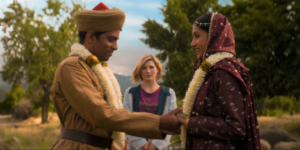
Again, like “Rosa”, there’s an alien element at work here. Stalking this sleepy little Indian villain are the bafdflingly and forgettably named Thijarians, our second assassin race of the season… only they’re not assassins anymore. Their homeworld destroyed, they now seek to honor the forgotten dead, giving us our second set of creatures that visit people at the moment of their death in as many episodes. Dying in the Doctor Who universe has certainly gotten exhausting over the last few years – you get honored by the Thijarians, copied by Testimony, uploaded to Missy’s Nethersphere and, if you’ve been particularly naughty, you get a visit from the Tesseract for your troubles.
The Thijarians are there to serve as a red herring, to make us think this is a scifi story when instead it’s a human one about prejudice and family. Ultimately, it doesn’t need to be there – there’s a serious question about whether or not a modern audience can watch a scifi-less Doctor Who story, but Chibnall is not particularly interested in answering it. Instead, we have the Thijarians as window-dressing to a wholly personal story about the Partition of India, and the effect it had on the people who lived in a country being cut in half.
It’s powerful, moving, dark stuff, but it’s neutered somewhat by implying that all of the blame falls on the people of India. The meddling and involvement of the British is only ever alluded to once, and the Doctor handwaves it away with an exceedingly out-of-character glib remark that rather implies she’s good buds with one of the British men responsible for the mess in the first place. Considering how judgmental the show was about American racism not three episodes prior, this feels like a significant error of omission. We cannot seem pious about other nations’ faults, failures and missteps if we are going to ignore our own. It’s the Racist Uncle at work; a deep hypocrisy, and it taints much of the historical aspect of this episode for me.
Those flaws aside – not to undercut them, not to pretend they aren’t there, but addressing the narrative rather than the setting – it’s a strong episode and, like “Rosa” before it, deeply important. But the weight and importance of the episode is, I feel, slightly lost when it serves as yet another dark episode in a season that has been relentlessly dark. At this point in the season we’ve had exactly one episode that’s even paid lip-service to the concept of fun, and that’s been “The Tsuranga Conundrum”. I love “Demons”, and it’s a story I will be revisiting for years to come despite its flaws. But I wish it had appeared in a season with some lighter, fun episodes.
11.07 – Kerblam!
My initial reaction upon finishing “Kerblam!” for the first time, was…

After weeks of episodes like that have felt devoid of fun, without the joy or spirit of Doctor Who past, “Kerblam!” felt like a return to the form that Russell T Davies had developed for the show, and that Steven Moffat had perfected. A mysterious summons, a menacing robot, a mystery at a warehouse owned by Space Amazon. All the ingredients are there!
Unfortunately the whole affair begins to fall apart under scrutiny, and what in the moment felt like a fine steak cooked to perfection turned out to be a Burger King quarter pounder with a soggy bun and stale fries.
Doctor Who has, historically speaking, had a pretty strong stance when it comes to capitalism. With stories like “The Moonbase”, “The Caves of Androzani” and “Thin Ice”, the message is clear – people before profits. Yet in “Kerblam!” that ideology is flipped on its head – scifi Amazon-alike Kerblam! itself is calling for help, because one of its people – the 10% of humans employed by a company that is 90% automated – has gone rogue, killing people in preparation for a massive terrorist attack engineered to make it seem that the company’s automated components are responsible. But the Doctor saves the day, and the System™ is saved. What’s more, the company is going to shut down for a month so they can investigate what happened! That’s nice. Shame they’re only going to be giving the humans two weeks paid time off while they do it.
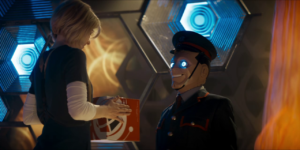
This desperately wants to be the dangerous-but-fun Doctor Who we all know and love, but its message is muddied. It’s a nice inversion, as the episode goes to great lengths to make the robots seem sinister only to reveal that it was them (more or less) who called for help! I do love a good inversion of a trope, but not when the subtext is “The systematic oppression of employers by a large corporation is basically fine.” Framing that company as Space Amazon, particularly given how much Amazon has been in the news over the last year, also feels like a misstep – this is a company where employees can’t even go and piss for fear of being fired, a company that made cities compete with each other to decide where their new headquarters is going to be only to choose the two most obvious locations close to seats of power anyway. Amazon isn’t a system, it’s a machine, and it’s a machine that does not value its human component. Framing it as anything other than that is a deeply, deeply irresponsible message to send out in 2018.
There’s so much cognitive dissonance going on in this episode it actively, properly hurts. The Doctor chides her companions for making fun of the robots – “That’s robophobic! Some of my best friends are robots!” – only to allow thousands of them to die at the very end of the episode. While you could argue that it was an us-or-them style conundrum, the Doctor doesn’t agonize over this decision for a single moment, nor does she consider any alternatives. The robots get blown up, neat bow, everybody lives, etcetera.
The Doctor also picks a fight with a supervisor, Jarva, for picking on one of the packing staff, but it’s never addressed again when it’s revealed Jarva is also looking into the same problem as the Doctor and her companions – the fact that he’s doing something good apparently trumps his dickish behavior earlier in the episode.
The episode’s biggest strength, however, is seeing the companions really come together as a team. It took seven bloody episodes, but Ryan, Graham and Yaz all have distinct roles to perform in this episode – nobody is sidelined, no-one exists solely to listen to another companion bare their soul. Finally, Team TARDIS feels like four parts of a whole, for individuals gelling for a common purpose. I like that. I wish it had lasted.
Arguably the best thing about this episode, other than the design of the Kerblam! robots (one gets the feeling they were manufactured by the same company that made Lister’s robot arm in Red Dwarf VII) is the performance by comedian and occasional actor Lee Mack. British audience know him from his standup, from being team captain on Would I Lie To You?, and for his long-running BBC sitcom Not Going Out, all of which demonstrate an acerbic wit. That wit is on brilliant display here, leading me to wonder whether the role was written with Mack in mind, or whether he did a lot of adlibbing that made it into the episode. Plus, both team WILTY? team captains have now been in Doctor Who, though arguably Mack is the only one of the two to appear on the show.
In the end, this episode wound up being not very good food at all, the television equivalent of seeing the McRib is back, ordering a McRib, eating a McRib, and then immediately regretting having eaten a McRib. It did leave me hopeful for more fun episodes to round out the season, but that hope was immediately dashed when the Next Time trailer included scenes of witches being drowned. Ooh ‘eck.
11.08 – The Witchfinders
Despite my reservations about yet another dark episode, this one ended up being one of my favorites, not to mention also being one of the most fun episodes of the run. A solid romp about witch trials in 17th century England, this is the first story that makes interesting use of the Doctor’s gender swap – first she uses the Psychic Paper to convince the locals of as village that she’s the Witchfinder General, but that trick doesn’t work when used on King James I who is incapable of seeing a woman in the role and so reads the Paper as saying she’s the assistant witchfinder. Later, the Doctor herself is tried as a witch. It’s superb writing, executed brilliantly.
The alien menace in this episode is also, shockingly, an actual menace! And it’s alien! Finally, our first proper threat after T’zim-Sha, and our first proper look at an alien since that first episode to boot (a number of episodes have featured aliens, but they have all looked disappointingly human). But it’s played as a mystery to begin with, as medieval witch trials give way to medieval zombies who, in turn, turn out to be possessed by an otherworldly alien force imprisoned underneath a tree for space crimes. The progression of the story is simple and organic, with dashes of folklore weaved throughout, though it’s easy to miss a key element about the tree that’s shared near the beginning of the episode but isn’t mentioned again until nearer its climax.
Alan Cumming plays King James as a camp admirer of torture implements who delights in witch hunting. The role is played for laughs, and I’ve seen arguments that the character shouldn’t have been a comic one considering he was instrumental in killing hundreds of women in his crusade against Satan. But what are tyrants for, if not to be mocked? Granted, King James isn’t alive to see the ridicule anymore, but putting him front-and-center as a ridiculous creature is, I think, the best thing for him. He deserves no better.
A wonderful mystery and a brilliantly-realized CG creature near the end both delight and entertain, leaving me to almost forget the rather disappointing makeup of the Morax Queen near the end. Team TARDIS comes together once again to face a foe, with each member of the team serving a function. At last, the show feels like it’s fallen into a groove. The wish – the hope – is that the shape of the season had finally taken form, and the production team new what they were doing.
11.09 – It Takes You Away
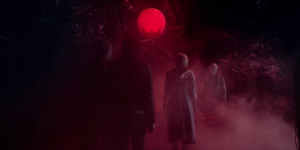
Ooh ‘eck, this could’ve been brilliant. Instead, it wound up just being very, very good.
What starts off as a wonderfully moody take on Scandinavian horror, complete with the esoteric name, takes several twists and turns throughout and becomes a piece about grief. Doctor Who has done grief before, most notably with “Heaven Sent” (which, coincidentally, was also the penultimate episode of its season), but this is a very different take on how grief affects us.
There are a lot of interesting ingredients in this episode that make for a compelling story – Erik, a father who, in the wake of the death of his wife, takes his blind daughter off to a cabin in the woods, who abandons that daughter and sets up a fake monster so he can travel to a mirror universe where his wife is still alive; the “Anti-Zone”, a buffer between this world and that one where a weird creature played by Kevin Eldon just sort of lives; a living universe, one that wants desperately to be a part of our own, but that cannot exist within it. Individually, these are great elements, and there’s a wonderful story to be told in there using them.
Sadly, this isn’t quite it. In the end, we get a sort-of retread of “The Three Doctors”, only this time the thing that can’t exist in our universe is… well, a universe itself, as opposed to a maniacal Time Lord bent on revenge. It almost works, and the moment between the Doctor and the Solitrat at the end of the episode is almost touching, but it isn’t quite there.
One of the biggest letdowns, though comes from that Solitrat mirror universe. The errant father gets to see his dead wife again, and Graham is even visited by his own recently-passed wife. But the Doctor gets… nobody. No one. The Solitract can’t think of a single person to bring back for her. The fan in me feels like this is a missed opportunity for a meeting with a mirror River Song, that seeing the Thirteenth Doctor reunited with her wife – albeit briefly, and as a duplicate – could have had some real impact for longterm fans. Hell, the longterm fan in me feels like this could have been a great moment for the Doctor to see Susan again (I am desperate for Susan to make an appearance on the show again – Carole Ann Ford is 78 years old now, and the clock is ticking on that potential moment). I understand why Chibnall might have opted not to have either of these possibilities happen, be it out of a desire to focus on the future or a wish not to tread on or undercut the stories of the past. My girlfriend pointed out that failing to have River appear feels like the producers have drawn a line in the sand – the Thirteenth Doctor can be this queer, but no further. I’m not sure I fully agree with that assessment, but as a queer man myself I understand that feeling. Certainly the optics aren’t good. It doesn’t have to be a deliberate snub, it just has to look like one to cause a problem,. And this, intentionally or not, gives the appearance of one.
I definitely recall enjoying the episode, but I’m having trouble recalling why. That can’t be a good sign. Lots of bits work, but in writing about it now I find myself struggling to piece together what it was that I watched. I know I enjoyed it. I know I loved every twist and turn, even if the execution left me wanting. But if you asked me for anything more than I’ve already given you, I’d turn up blank. There’s nothing there. I don’t like that.
Still, Erik isn’t winning as Father of the Year Awards, is he?
11.10 – The Battle of Ranskoor Av Kolos
I’m just going to start with this – I hate that title. I hate it. I hate the name of episode even more than I hated the name of “The Tsuranga Conundrum”. Chibnall isn’t good at naming things. Say what you like about Russell T Davies and Steven Moffat (both of whom I adore, by the way), but their runs were filled with poetic turns of phrase and cleverly-named aliens. Their episode titles are, for the most part, descriptive. “A Good Man Goes To War” is still – still! – one of my favorite episode titles ever. But “The Battle of Ranskoor Av Kolos” is nothing. It says nothing, it means nothing, it describes nothing. There isn’t even a battle in this episode.
Fun fact: The Doctor translates the planet’s name as “Disintegrator of the Soul” which is an infinitely better episode title (though still isn’t great, obviously) and they just throw it away at the top of the episode. It’s not even alluded to or mentioned ever again.
The episode… is fine. It’s okay.
T’zim-Sha reappears, thousands of years later, after having been exiled to the planet Crab Rangoon. Once there, he abuses the powers of two super-religious Earthbenders (that’s basically what they are, let’s not pretend they aren’t) to create a weapon that can shrink planets down to the size of cricket balls. If that last part sounds familiar, it was also the plot of “The Pirate Planet”, a 1978 Doctor Who serial written by Douglas Adams. Hey, if you’re going to steal, steal from the best.
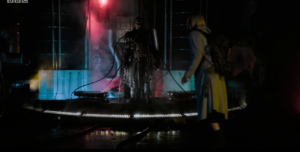
The reappearance of T’zim-Sha isn’t a huge surprise, considering the second episode of the season mentioned the Stenza, but it highlights a problem this season has had – no throughline. In Russell T Davies’ tenure as showrunner, we got standalone stories with keywords and repeated phrases popping up – Bad Wolf, Torchwood, the Medusa Cascade. In Moffat’s era we got recurring plot elements – the crack in the wall, Trenzalore, the Hybrid. Early on, Chibnall seemed to be paying lip service to that concept, and indeed as a not inconsiderable amount of the audience would likely be enjoying this season in one go on a streaming service sometime next year it’s not a bad trend to follow on. But he doesn’t, to the point where the mention of the Stenza way back in “The Ghost Monument” feels, like the mention of the Timeless Child alongside it, like wall spaghetti.
In previous seasons, the finale has been something we’d built up to; events have led to this. But for this one, we had nothing but an episode title we couldn’t remember and an abridged cast list of actors playing characters we’d not seen before. No build-up. In truth, I’ve loved that about this season – I’ve gone into every episode knowing almost nothing. That’s a far cry from previous seasons where we’d often know what to expect of the season finale long before the season itself had even started airing (oh, to exist in a universe where John Simm’s Master or the Mondasian Cybermen hadn’t been spoiled ahead of time). But even then, I had hoped for some in-narrative… stuff. Instead, nothing. T’zim-Sha is back, he’s shrinkin’ planets, and we’re expected to just sort-of roll with that.
The story plays with grief some more as Graham tells the Doctor he’s going to kill T’zim-Sha if he sees him, which feels like an odd choice considering we’d just dealt with that in the previous, largely unrelated episode, but there’s also an argument to be made that the events of “It Takes You Away” are what prompted this resurgence in Graham’s sense of loss over his wife. He did, after all, technically lose her twice. That’s more likely to be me reaching than it is to be a deliberate creative choice, though.
Despite him telling the Doctor that he plans to kill T’zim-Sha, however, the Doctor does nothing to stop him besides a halfhearted “go back to the TARDIS.” You can’t help but feel like Capaldi’s Doctor would have turned that into a shouting match, an order he won’t back down from, or Tennant or Smith’s Doctor turning it into an ethical debate, a plea for Graham’s soul. Whittaker, however, does nothing – it’d inconvenience the plot to have her more invested in Graham’s story, so it doesn’t come up again. At the end of the episode, after Graham has revealed he didn’t kill him (because of course he wasn’t going to) she calls him one of the strongest people she knows. It doesn’t feel earned.
Functionally, this episode has flaws. We have Paltraki, whose memory has been affected by the psychic attack of the planet itself, whose memory is spotty right up until the story needs him to suddenly remember something. The Ux are an interesting concept, but the episode makes a big deal out of T’zim-Sha taking advantage of their faith without really addressing the consequences or what that means for their belief system. The Doctor says shrinking planets is impossible and unstable, despite having seen someone do more or less exactly this very thing before. Then there’s that moment near the end, with the neural blockers.
I won’t lie, I thought that moment was going to set up something interesting – the Doctor and Yaz, suddenly without protection against the psychic attack of the planet. But it’s very quickly brushed off, and ultimately nothing comes of it. It’s another example, like the carnivorous water in “The Ghost Monument”, of an imminent threat that just sort-of goes away. The whole scene felt like watching someone play Dungeons & Dragons more than it felt like a scene with, y’know, stakes and risk. It’s disappointing moments like that one, littered throughout both this episode and others penned by Chibnall, that make it difficult to enjoy this season.
As finale goes, it had stakes. The fate of several planets, including our own, hang in the balance. But overcoming those odds feels almost effortless for the Doctor and her companions. Everything they need to succeed is handed to them – Hell, the Doctor literally stepped out of the TARDIS with the tools she needed to save the day in her pocket. There’s little in the way of genuine risk and every conceivable reward, including a Doctor-safe form of revenge for Graham and Ryan. Ultimately, what do stakes matter if resolving the crisis is as simple as switching the Ux off and on again?
And then it just sort of… ends, which might be fine for a middle-of-the-season episode, but even when Moffat was giving us single-episode finales there was still a feeling of epilogue to the last episode of the season. This one just sort of runs out of track, which means the season runs out of track. Season 11 didn’t finish. It stopped. that’s not great.
The finale has a ton of really neat ideas in it, but where it falters – and, again, this has been a recurring theme this season – is the execution.
The Nutshell
There is a lot to like this season. Jodie Whittaker’s performance has been above and beyond expectations. The companions, when they’re given something to do, are phenomenal. Even Bradley Walsh, who I was most concerned about considering he is, in the UK, a gameshow host. Yes, alright, he’s appeared in other shows including Law & Order: UK and as many soaps as you like, but I’d not been exposed to that. I was delighted to learn that he was, in fact, brilliant.
Certainly, also, there is no shortage of big ideas. The Solitract, the Ux, the P’Ting, even the idea of doing Space Amazon is interesting. The problem, though, lies in the execution – this has been an exceptionally dour season of Doctor Who, lacking the energy and joie de vivre of seasons past.
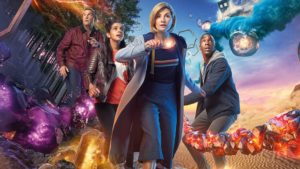
There hasn’t been a lot of fun, or color. So much color was incorporated into the show’s publicity, including that brilliant, bold and vibrant promotional poster (left). The show itself, though? Dark. Grim. Moody. Cinematic, certainly, but at the expense of character. That poster almost promises a return to the Smallville lighting of the Russell T Davies era, and yet – and yet! – we get the most visually dim and uninspired season of the show since its return in 2005.
The best criticisms of Chibnall have come from people much, much smarter than I am. A critic on Tumblr – possibly scriptscribbles – once described his writing as cynical, and certainly looking at his past Doctor Who contributions it’s hard to disagree. “Dinosaurs on a Spaceship” is a goofy romp, but it ends with one of the darkest decisions the Doctor has made in the modern run of the show. “42” and “The Hungry Earth”/”Cold Blood” are, at their core, about the worst ways people can behave. Half of Torchwood is about people showing their worst selves. That’s not to say that cynical can’t be entertaining – case in point, the season 4 episode “Midnight” -penned by Russell T Davies – but it can’t be that every week, and there’s been a lot of cynicism in the show.
Another critic of the season, Andrew Ellard (whose credits as a script editor include The IT Crowd and Red Dwarf), has said that the biggest flaw this season has been big ideas, huge moments, that have zero impact on the outcome of the story. “It’s an imitation of drama,” says Ellard, and that’s a damning and accurate description of why a lot of this season, particularly the episodes written by Chibnall, simply doesn’t work.
As someone with a disability myself, Ryan’s dyspraxia has me frustrated. At first, I was giddy to see a character with an invisible illness on-screen, and that it continued to pose difficulties in the second episode boded well. But aside from a vague allusion to the condition in “Kerblam!”, it doesn’t come up again. By “The Battle of Ranskoor Av Kolos” it is all but forgotten – a disappointment, and a shame.
If I had to rank the seasons – and I typically do once a year – this is not a high scorer. It might be a serious contender for the worst season of the revival. I hate that. I hate typing those words. But that’s how I feel right now. For as wonderful as Jodie’s performance is, for as much wide-eyed enthusiasm she pulls off in the role, she can’t paper over the cracks in weak scripts and half-baked stories that don’t rise to their full potential. The first woman to play the role deserves infinitely better than she has been given, because there are corners of the fandom who will blame Chibnall’s failures on her.
I’ll also say this – I didn’t come into this season expecting disappointment. I came in hopeful, enthusiastic and energized. There are people online who went into the new season expecting disappointment, which strikes me as an odd way to watch a show. I wanted to be dazzled, I wanted to be excited. For a while, for that first episode at least, I was. That excitement, sadly, didn’t last.
The Future – New Year’s Day, 2020 and Beyond
Yet I am still excited for her second season. My hope – my big, fond, improbable hope – is that Chibbers will learn from his mistakes and we’ll get to see some of that Chibnall genius we’d been promised from Steven Moffat, from fans of Broadchurch, from the people who inexplicably still love Torchwood despite the fact it contains easily the single worst contribution to Doctor Who lore since “Timelash” (it’s “Cyberwoman”, by the way, also written by Chibnall). The first season of a new Doctor is, with few exceptions, not perfect; as the new production team find their feet, can season 12 improve upon the template they’ve established?
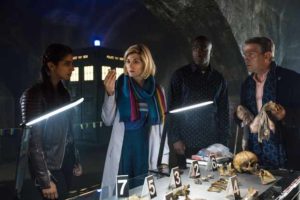
The answer, perhaps predictably, is: We don’t know, and we won’t know for over a year. Season 12 is slated for an early 2020 release, meaning that 2019 will, New Year’s Day Special aside, be another year without Doctor Who. In the world of streaming television – indeed, in the world of British television – that’s not unusual. But with the ratings success the show has had this year (apparently larger audiences aren’t concerned with the stuff I’ve written about here, and why should they be?) it seems foolish not to capitalize on that as soon as possible. A brilliant piece in the New Statesman argues that Doctor Who not returning to TV in 2019 is normal, but dangerous – many children who have just had their first taste of the show may well grow out of it between seasons, while many children just now entering the prime age for the show to hook their tendrils into it might miss their window.
Of course, people said the same thing about the gap between seasons 10 and 11, and “The Woman Who Fell to Earth” had the highest season premiere ratings since “Rose” in 2005, so what on Earth do critics know, eh?
I do know one thing, though – I have never been more concerned for the future of the show that I love. A good season of Doctor Who is many things, but it is never boring. This season, I found myself bored several times, and that is a problem. Doctor Who is not a show that is allowed the luxury of boredom – the last time the show became boring, it was taken off the air and we had to wait 14 years for it to return. That’s a little bit doomsayer-y, I know, but I worry. Importantly, I don’t want to worry. I want to be hopeful. Whittaker’s first scene at the end of “Twice Upon a Time” had me hopeful. Her final scene in “The Battle of Ranskoor Av Kolos” – ironically, a speech about hope – did not instill such positivity. That hope in an improved season 12 is something I’ve arrived at later, either out of blind optimism or sheer bloodymindedness. Call it what you like.
Doctor Who needs writers with imagination. This season hasn’t been short on imagination, but it’s struggled in the execution. Hopefully, in 2020, we’ll see a bit more of both. I am, and always will be, the optimist. The hoper of far-flung hopes, and the dreamer of improbable dreams. Until then, roll on New Year’s Special.
Thanks for reading! If you’ve enjoyed this, please consider making a donation via PayPal. See you next time!
Leave a Reply